2019_2020学年牛津译林版选修7 Unit3 The world online3.2知识点课件(29张ppt)
文档属性
| 名称 | 2019_2020学年牛津译林版选修7 Unit3 The world online3.2知识点课件(29张ppt) | 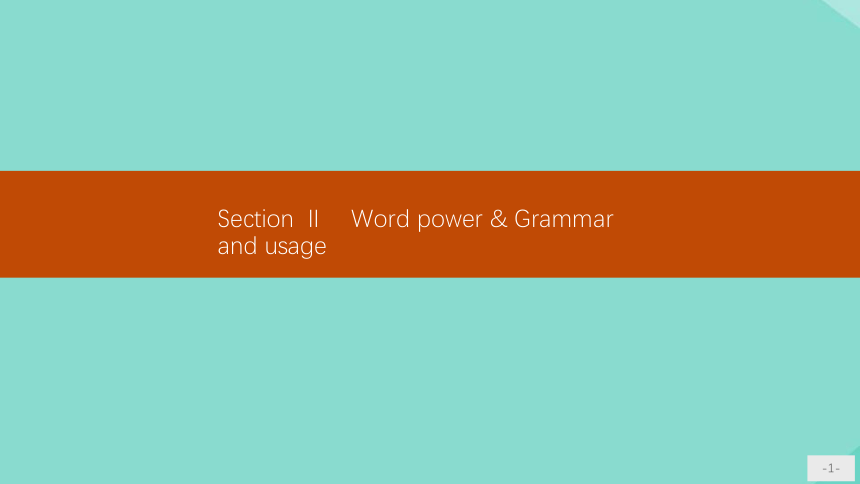 | |
| 格式 | zip | ||
| 文件大小 | 333.1KB | ||
| 资源类型 | 教案 | ||
| 版本资源 | 牛津译林版 | ||
| 科目 | 英语 | ||
| 更新时间 | 2019-08-25 18:58:54 | ||
图片预览

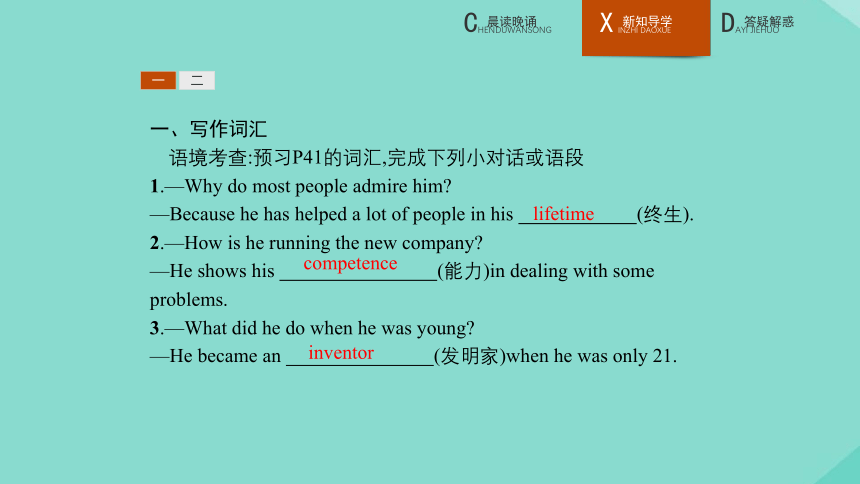


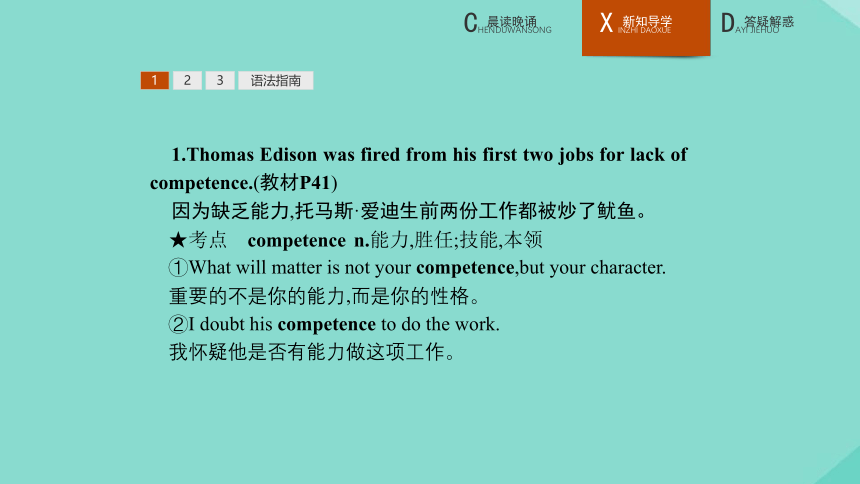
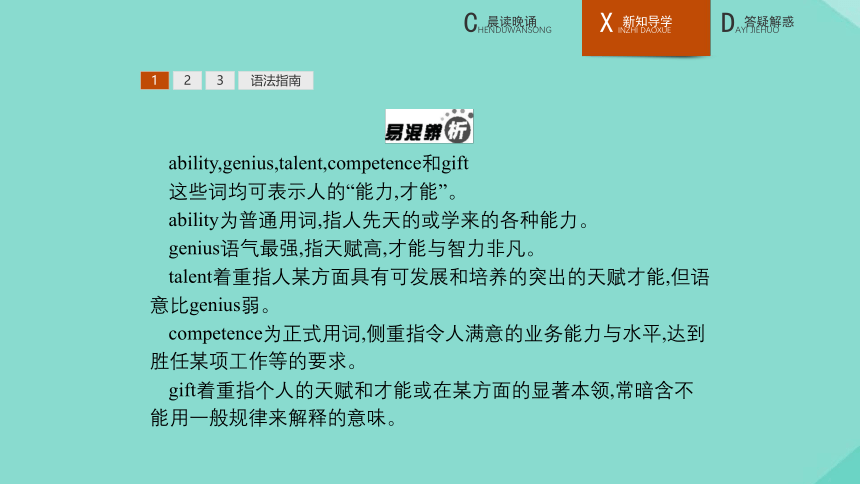
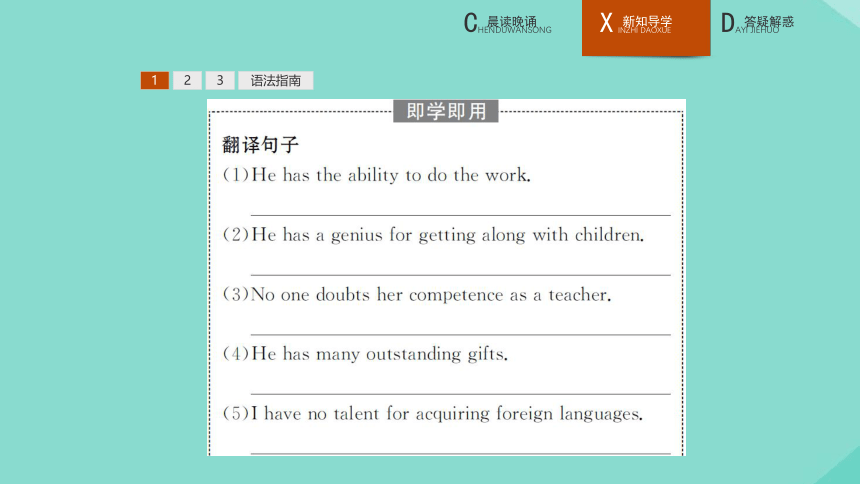
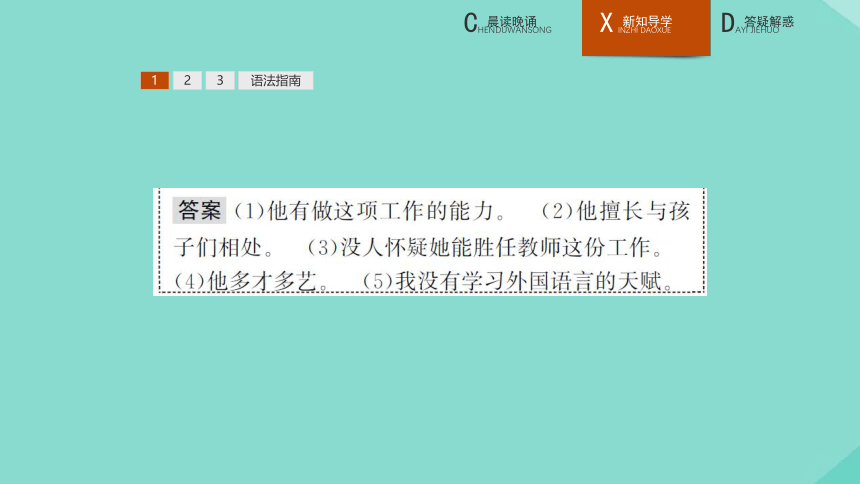

文档简介
(共29张PPT)
Section Ⅱ Word power & Grammar and usage
一
二
一、写作词汇
语境考查:预习P41的词汇,完成下列小对话或语段
1.—Why do most people admire him?
—Because he has helped a lot of people in his (终生).?
2.—How is he running the new company?
—He shows his (能力)in dealing with some problems.?
3.—What did he do when he was young?
—He became an ?(发明家)when he was only 21.?
lifetime
competence
inventor
一
二
4.—Why is the woman crying over there?
—Because she is ?(抛弃)by her husband.?
5.—Would you like to go to the cinema this Sunday?
—I’d love to,but I have an ?(预约)with my doctor.?
abandoned
appointment
一
二
二、阅读词汇
预习P41的词汇,写出画线部分的汉语意思
The old man has made a great achievement in his lifetime 1. .When he was only 16,he showed amazing competence 2. in science.His first appointment 3. was as a lecturer at a famous university.Later,he became a famous inventor 4. .He was kind and adopted some abandoned 5. children.?
一生
能力
任命
发明家
被抛弃的
1
2
3
语法指南
1.Thomas Edison was fired from his first two jobs for lack of competence.(教材P41)
因为缺乏能力,托马斯·爱迪生前两份工作都被炒了鱿鱼。
★考点 competence n.能力,胜任;技能,本领
①What will matter is not your competence,but your character.
重要的不是你的能力,而是你的性格。
②I doubt his competence to do the work.
我怀疑他是否有能力做这项工作。
1
2
3
语法指南
ability,genius,talent,competence和gift
这些词均可表示人的“能力,才能”。
ability为普通用词,指人先天的或学来的各种能力。
genius语气最强,指天赋高,才能与智力非凡。
talent着重指人某方面具有可发展和培养的突出的天赋才能,但语意比genius弱。
competence为正式用词,侧重指令人满意的业务能力与水平,达到胜任某项工作等的要求。
gift着重指个人的天赋和才能或在某方面的显著本领,常暗含不能用一般规律来解释的意味。
1
2
3
语法指南
1
2
3
语法指南
1
2
3
语法指南
2.They would not have achieved their success if they had abandoned their dreams.(教材P41)
如果他们放弃了梦想的话,他们就不会取得成功了。
★考点 abandon vt.放弃;抛弃,舍弃 n.放任;放纵
①【高考典句】(2015广东)Mr.Johnson lived in the woods with his wife and children.He owned a farm,which looked almost abandoned.
约翰逊先生与他的妻子和孩子们住在树林里,他有一个农场,看上去几乎废弃了。
②Despite some difficulties,they’re not going to abandon the plan.
尽管遇到了一些困难,但他们并不打算放弃这个计划。
1
2
3
语法指南
考点延伸?
1)阅读下列句子,指出黑体词构成的词组及其含义
③Those who abandon themselves to despair cannot succeed.
那些自暴自弃的人无法成功。
词组 abandon oneself to 含义 沉迷于……?
④He signed cheques with careless abandon.
他无所顾忌地乱开支票。
词组 with abandon 含义 放任地?
2)阅读下列句子,指出黑体词的词性和含义
⑤The abandoned boy later became a famous singer.
这个被抛弃的男孩后来成了一名著名歌手。
词性 形容词 含义 被抛弃的?
1
2
3
语法指南
abandon vt.放弃;抛弃;舍弃 n.放任;放纵
abandon oneself to 沉迷于……,放纵(感情等)
with abandon 放任地;放肆地
abandoned adj. 被抛弃的,废弃的
1
2
3
语法指南
(2)Later they went to an (abandon)house.?
完成句子
(3)在失败后,这个人沉迷于酒了。
The man alcohol after his failure.?
(4)这个女孩在十年前被父母抛弃了。
The girl ten years ago.?
答案(1)with (2)abandoned (3)abandoned himself to (4)was abandoned by her parents
1
2
3
语法指南
3.I think I’d better apologize to him tomorrow for not keeping the appointment.(教材P41)
我想我明天最好为没能赴约向他道歉。
★考点 appointment n.约会,预约;任命,委任
①Rose had forgotten all about their appointment.
罗斯把他们的预约全忘掉了。
②Consultations can be arranged at other time by appointment.
磋商可以通过预约安排在其他时间。
③The news of his appointment filtered out before it was officially advertised.
关于他的任命尚未正式宣布,消息就已经泄露了出去。
1
2
3
语法指南
考点延伸?
1)阅读下列句子,指出黑体词的词性和含义
④We appointed the school as the place for the meeting.
我们确定学校为会面地点。
词性 动词 含义 确定
⑤Who shall we appoint as chairperson?
我们委派谁担任主席呢?
词性 动词 含义 任命
2)阅读下列句子,指出黑体词所构成的词组及其含义
⑥We will appoint the girl to help you.
我们会派去这个女孩帮助你。
词组 appoint sb.to do sth. 含义 委派某人做某事?
1
2
3
语法指南
appointment n.约会,预约;任命,委任
appoint vt.确定;任命
appoint sb.to be /as...任命某人为……
appoint sb.to do sth.委派某人做某事
1
2
3
语法指南
(2)我真不想催你,但我稍后还有一个约会。
I hate to rush you but I ?later on.?
(3)德雷克那一帮人对我的任命很不满。
Drake and his cohorts were not pleased with ?.?
(4)他的儿子被任命为这个学校的校长。
His son the headmaster of this school.?
(5)他们会指定谁去参加典礼?
Who will they ???
1
2
3
语法指南
答案(1)have made an appointment (2)have another appointment (3)my appointment (4)was appointed as (5)appoint to attend the ceremony
1
2
3
语法指南
助动词
一、概念
助动词是帮助主要动词构成各种时态、语态以及否定或疑问结构的动词。助动词分为时态助动词和结构助动词两种。
1
2
3
语法指南
二、助动词的种类
1
2
3
语法指南
三、相关知识点精讲
1.助动词be的用法
(1)be+现在分词,构成进行时态。
They are having a meeting.
他们正在开会。
English is becoming more and more important.
英语正变得越来越重要。
(2)be+过去分词,构成被动语态。
The window was broken by Tom.
窗户是汤姆打破的。
English is taught throughout the world.
世界各地都教英语。
1
2
3
语法指南
(3)be+动词不定式,可表示下列内容:
①表示最近的、未来的计划或安排。
He is to go to New York next week.
他下周要去纽约。
We are to teach the freshmen.
我们将要教大一新生。
注意:这种用法也可以说成是将来时态的一种表达法。
②表示命令。
You are to explain this.
对此你要做出解释。
1
2
3
语法指南
③征求意见。
How am I to answer him?
我该怎样答复他?
Who is to go there?
谁该去那儿呢?
④表示相约,商定。
We are to meet at the school gate at seven tomorrow morning.
我们明天早晨7点在校门口集合。
1
2
3
语法指南
2.助动词have的用法
(1)have+过去分词,构成完成时态。
He has left for London.
他已经去了伦敦。
By the end of last month,they had finished half of their work.
到上月末为止,他们已经完成了一半的工作。
(2)have+been+现在分词,构成完成进行时。
I have been studying English for ten years.
我一直在学英语,已达十年之久。
(3)have+been+过去分词,构成完成时态的被动语态。
English has been widely used in many fields for many years.
多年来,英语已被广泛应用于众多领域。
1
2
3
语法指南
3.助动词do 的用法
(1)构成一般疑问句。
Do you want to pass the exam?
你想通过考试吗?
Did you study German?
你(们)学过德语吗?
(2)do+not 构成否定句。
I do not want to be criticized.
我不想挨批评。
He doesn’t like to study.
他不喜欢学习。
In the past,many students did not know the importance of English.
过去,很多学生不知道英语的重要性。
1
2
3
语法指南
(3)构成否定祈使句。
Don’t go there.
不要去那里。
Don’t be so absent-minded.
不要这么心不在焉。
注意:构成否定祈使句只用do,不用did和does。
(4)放在动词原形前,加强该动词的语气。
Do come to my birthday party.
一定要来参加我的生日聚会。
I did go there.
我确实去那儿了。
I do miss you.
我确实想你了。
1
2
3
语法指南
(5)用于倒装句。
Never did I hear of such a thing.
我从未听说过这样的事情。
Only when we begin our college life do we realize the importance of English.
进入大学以后,我们才认识到英语的重要性。
注意:引导此类倒装句的副词有never,seldom,rarely,little,only,so等。
1
2
3
语法指南
(6)用作代动词。
—Do you like Beijing?
你喜欢北京吗?
—Yes,I do.
是的,我喜欢。(do用作代动词,代替like Beijing)
He knows how to drive a car,doesn’t he?
他知道如何开车,对吧?
1
2
3
语法指南
4.助动词shall和will的用法
shall和will作为助动词,可以与动词原形一起构成一般将来时。
I shall study harder at English.
我将更加努力地学习英语。
He will go to Shanghai.
他要去上海。
注意:在过去的语法中,语法学家说shall用于第一人称,will 只用于第二、第三人称。现在,尤其是在口语中,will常用于第一人称,但shall只用于第一人称,如用于第二、第三人称,就失去助动词的意义,已变为情态动词,试比较:
He shall come.他必须来。(shall有命令的意味)
He will come.他要来。(will只与动词原形构成一般将来时)
1
2
3
语法指南
5.助动词should,would的用法
(1)should无词义,只是shall的过去形式,与动词原形构成过去将来时,只用于第一人称。
I telephoned him yesterday to ask what I should do next week.
我昨天给他打电话,问他我下周做什么。
比较:“What shall I do next week?” I asked.“我下周做什么?”我问道。
可以说,直接引语变成间接引语时,shall变成了should。
(2)would也无词义,是will的过去形式,与动词原形构成过去将来时,用于第二、第三人称。
He said he would come.他说他要来。
比较:“I will go,” he said.他说:“我要去。”
此句变成间接引语,就成了He said he would come.。原来的will变成would,go变成了come。
Section Ⅱ Word power & Grammar and usage
一
二
一、写作词汇
语境考查:预习P41的词汇,完成下列小对话或语段
1.—Why do most people admire him?
—Because he has helped a lot of people in his (终生).?
2.—How is he running the new company?
—He shows his (能力)in dealing with some problems.?
3.—What did he do when he was young?
—He became an ?(发明家)when he was only 21.?
lifetime
competence
inventor
一
二
4.—Why is the woman crying over there?
—Because she is ?(抛弃)by her husband.?
5.—Would you like to go to the cinema this Sunday?
—I’d love to,but I have an ?(预约)with my doctor.?
abandoned
appointment
一
二
二、阅读词汇
预习P41的词汇,写出画线部分的汉语意思
The old man has made a great achievement in his lifetime 1. .When he was only 16,he showed amazing competence 2. in science.His first appointment 3. was as a lecturer at a famous university.Later,he became a famous inventor 4. .He was kind and adopted some abandoned 5. children.?
一生
能力
任命
发明家
被抛弃的
1
2
3
语法指南
1.Thomas Edison was fired from his first two jobs for lack of competence.(教材P41)
因为缺乏能力,托马斯·爱迪生前两份工作都被炒了鱿鱼。
★考点 competence n.能力,胜任;技能,本领
①What will matter is not your competence,but your character.
重要的不是你的能力,而是你的性格。
②I doubt his competence to do the work.
我怀疑他是否有能力做这项工作。
1
2
3
语法指南
ability,genius,talent,competence和gift
这些词均可表示人的“能力,才能”。
ability为普通用词,指人先天的或学来的各种能力。
genius语气最强,指天赋高,才能与智力非凡。
talent着重指人某方面具有可发展和培养的突出的天赋才能,但语意比genius弱。
competence为正式用词,侧重指令人满意的业务能力与水平,达到胜任某项工作等的要求。
gift着重指个人的天赋和才能或在某方面的显著本领,常暗含不能用一般规律来解释的意味。
1
2
3
语法指南
1
2
3
语法指南
1
2
3
语法指南
2.They would not have achieved their success if they had abandoned their dreams.(教材P41)
如果他们放弃了梦想的话,他们就不会取得成功了。
★考点 abandon vt.放弃;抛弃,舍弃 n.放任;放纵
①【高考典句】(2015广东)Mr.Johnson lived in the woods with his wife and children.He owned a farm,which looked almost abandoned.
约翰逊先生与他的妻子和孩子们住在树林里,他有一个农场,看上去几乎废弃了。
②Despite some difficulties,they’re not going to abandon the plan.
尽管遇到了一些困难,但他们并不打算放弃这个计划。
1
2
3
语法指南
考点延伸?
1)阅读下列句子,指出黑体词构成的词组及其含义
③Those who abandon themselves to despair cannot succeed.
那些自暴自弃的人无法成功。
词组 abandon oneself to 含义 沉迷于……?
④He signed cheques with careless abandon.
他无所顾忌地乱开支票。
词组 with abandon 含义 放任地?
2)阅读下列句子,指出黑体词的词性和含义
⑤The abandoned boy later became a famous singer.
这个被抛弃的男孩后来成了一名著名歌手。
词性 形容词 含义 被抛弃的?
1
2
3
语法指南
abandon vt.放弃;抛弃;舍弃 n.放任;放纵
abandon oneself to 沉迷于……,放纵(感情等)
with abandon 放任地;放肆地
abandoned adj. 被抛弃的,废弃的
1
2
3
语法指南
(2)Later they went to an (abandon)house.?
完成句子
(3)在失败后,这个人沉迷于酒了。
The man alcohol after his failure.?
(4)这个女孩在十年前被父母抛弃了。
The girl ten years ago.?
答案(1)with (2)abandoned (3)abandoned himself to (4)was abandoned by her parents
1
2
3
语法指南
3.I think I’d better apologize to him tomorrow for not keeping the appointment.(教材P41)
我想我明天最好为没能赴约向他道歉。
★考点 appointment n.约会,预约;任命,委任
①Rose had forgotten all about their appointment.
罗斯把他们的预约全忘掉了。
②Consultations can be arranged at other time by appointment.
磋商可以通过预约安排在其他时间。
③The news of his appointment filtered out before it was officially advertised.
关于他的任命尚未正式宣布,消息就已经泄露了出去。
1
2
3
语法指南
考点延伸?
1)阅读下列句子,指出黑体词的词性和含义
④We appointed the school as the place for the meeting.
我们确定学校为会面地点。
词性 动词 含义 确定
⑤Who shall we appoint as chairperson?
我们委派谁担任主席呢?
词性 动词 含义 任命
2)阅读下列句子,指出黑体词所构成的词组及其含义
⑥We will appoint the girl to help you.
我们会派去这个女孩帮助你。
词组 appoint sb.to do sth. 含义 委派某人做某事?
1
2
3
语法指南
appointment n.约会,预约;任命,委任
appoint vt.确定;任命
appoint sb.to be /as...任命某人为……
appoint sb.to do sth.委派某人做某事
1
2
3
语法指南
(2)我真不想催你,但我稍后还有一个约会。
I hate to rush you but I ?later on.?
(3)德雷克那一帮人对我的任命很不满。
Drake and his cohorts were not pleased with ?.?
(4)他的儿子被任命为这个学校的校长。
His son the headmaster of this school.?
(5)他们会指定谁去参加典礼?
Who will they ???
1
2
3
语法指南
答案(1)have made an appointment (2)have another appointment (3)my appointment (4)was appointed as (5)appoint to attend the ceremony
1
2
3
语法指南
助动词
一、概念
助动词是帮助主要动词构成各种时态、语态以及否定或疑问结构的动词。助动词分为时态助动词和结构助动词两种。
1
2
3
语法指南
二、助动词的种类
1
2
3
语法指南
三、相关知识点精讲
1.助动词be的用法
(1)be+现在分词,构成进行时态。
They are having a meeting.
他们正在开会。
English is becoming more and more important.
英语正变得越来越重要。
(2)be+过去分词,构成被动语态。
The window was broken by Tom.
窗户是汤姆打破的。
English is taught throughout the world.
世界各地都教英语。
1
2
3
语法指南
(3)be+动词不定式,可表示下列内容:
①表示最近的、未来的计划或安排。
He is to go to New York next week.
他下周要去纽约。
We are to teach the freshmen.
我们将要教大一新生。
注意:这种用法也可以说成是将来时态的一种表达法。
②表示命令。
You are to explain this.
对此你要做出解释。
1
2
3
语法指南
③征求意见。
How am I to answer him?
我该怎样答复他?
Who is to go there?
谁该去那儿呢?
④表示相约,商定。
We are to meet at the school gate at seven tomorrow morning.
我们明天早晨7点在校门口集合。
1
2
3
语法指南
2.助动词have的用法
(1)have+过去分词,构成完成时态。
He has left for London.
他已经去了伦敦。
By the end of last month,they had finished half of their work.
到上月末为止,他们已经完成了一半的工作。
(2)have+been+现在分词,构成完成进行时。
I have been studying English for ten years.
我一直在学英语,已达十年之久。
(3)have+been+过去分词,构成完成时态的被动语态。
English has been widely used in many fields for many years.
多年来,英语已被广泛应用于众多领域。
1
2
3
语法指南
3.助动词do 的用法
(1)构成一般疑问句。
Do you want to pass the exam?
你想通过考试吗?
Did you study German?
你(们)学过德语吗?
(2)do+not 构成否定句。
I do not want to be criticized.
我不想挨批评。
He doesn’t like to study.
他不喜欢学习。
In the past,many students did not know the importance of English.
过去,很多学生不知道英语的重要性。
1
2
3
语法指南
(3)构成否定祈使句。
Don’t go there.
不要去那里。
Don’t be so absent-minded.
不要这么心不在焉。
注意:构成否定祈使句只用do,不用did和does。
(4)放在动词原形前,加强该动词的语气。
Do come to my birthday party.
一定要来参加我的生日聚会。
I did go there.
我确实去那儿了。
I do miss you.
我确实想你了。
1
2
3
语法指南
(5)用于倒装句。
Never did I hear of such a thing.
我从未听说过这样的事情。
Only when we begin our college life do we realize the importance of English.
进入大学以后,我们才认识到英语的重要性。
注意:引导此类倒装句的副词有never,seldom,rarely,little,only,so等。
1
2
3
语法指南
(6)用作代动词。
—Do you like Beijing?
你喜欢北京吗?
—Yes,I do.
是的,我喜欢。(do用作代动词,代替like Beijing)
He knows how to drive a car,doesn’t he?
他知道如何开车,对吧?
1
2
3
语法指南
4.助动词shall和will的用法
shall和will作为助动词,可以与动词原形一起构成一般将来时。
I shall study harder at English.
我将更加努力地学习英语。
He will go to Shanghai.
他要去上海。
注意:在过去的语法中,语法学家说shall用于第一人称,will 只用于第二、第三人称。现在,尤其是在口语中,will常用于第一人称,但shall只用于第一人称,如用于第二、第三人称,就失去助动词的意义,已变为情态动词,试比较:
He shall come.他必须来。(shall有命令的意味)
He will come.他要来。(will只与动词原形构成一般将来时)
1
2
3
语法指南
5.助动词should,would的用法
(1)should无词义,只是shall的过去形式,与动词原形构成过去将来时,只用于第一人称。
I telephoned him yesterday to ask what I should do next week.
我昨天给他打电话,问他我下周做什么。
比较:“What shall I do next week?” I asked.“我下周做什么?”我问道。
可以说,直接引语变成间接引语时,shall变成了should。
(2)would也无词义,是will的过去形式,与动词原形构成过去将来时,用于第二、第三人称。
He said he would come.他说他要来。
比较:“I will go,” he said.他说:“我要去。”
此句变成间接引语,就成了He said he would come.。原来的will变成would,go变成了come。
